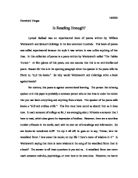10/6/03
Dominick Vargas
Is Reading Enough?
Lyrical Ballads was an experimental book of poems written by William Wordsworth and Samuel Coleridge in the late seventeen hundreds. This book of poems was called experimental because the style it was written in was unlike anything of that time. In this collection of poems is a poem written by Wordsworth called “The Tables Turned.” At first glance of this poem, one can assume that this is an anti-intellectual poem. Reason for this is in the opening paragraph when the speaker in the poem tells his friend to, “quit his books.” So why would Wordsworth and Coleridge write a book against books?
For starters, this poem is against conventional learning. The person that is being spoken to in this paper is probably a common person who at that time is under the notion that you can learn everything and anything from a book. The speaker of the poem calls books a “dull and endless strife.” This line must have sound as absurd then as it does now. In each semester of college so far, I am averaging about 10 books a semester that I have to read, which does gives the impression of endless. However, there are a countless number of books in the world, each with its own set of knowledge and information. So can books be considered dull? To top it all off, he goes on to say, “Come, here the woodland linnet / how sweet his music; on my life / there’s more of wisdom in it.” Is Wordsworth saying that there is more wisdom in the song of the woodland linnet than in a book? The answer to all these questions is yes and no. A woodland linnet can never teach someone calculus, psychology, or even how to tie ones shoe. However, no matter how much you can read, you will never hear the sound of music coming from the woodland linnet. This feeling that one receives from that experience is just as important, perhaps even more important, than reading about it. At the end of the poem Wordsworth goes on to say, “enough of science and of art…bring with you a heart / that watches and receives.” The words at the end are very peculiar. The heart is not the organ that stores knowledge or gives us sight. Wordsworth uses the word heart to imply feelings because that is what most people associate the word heart with. Wordsworth is saying that one needs more than just books, and pictures. Watches and receives are also interesting words. When someone watches something, one has to look out, and when someone receives something, one takes in. So the words watch and receive imply give and take, action and reaction. In other words, it means interaction. One needs to have this experience of interaction or else they will never fully understand.







